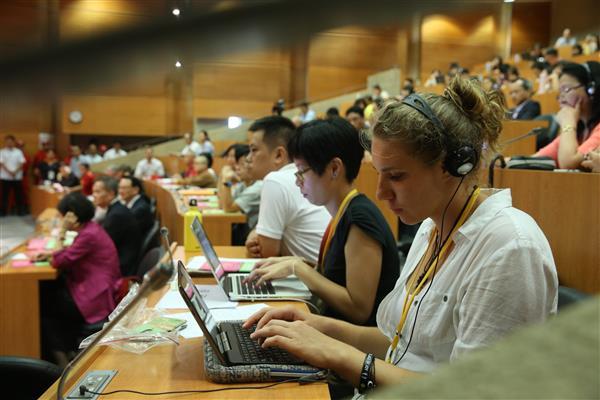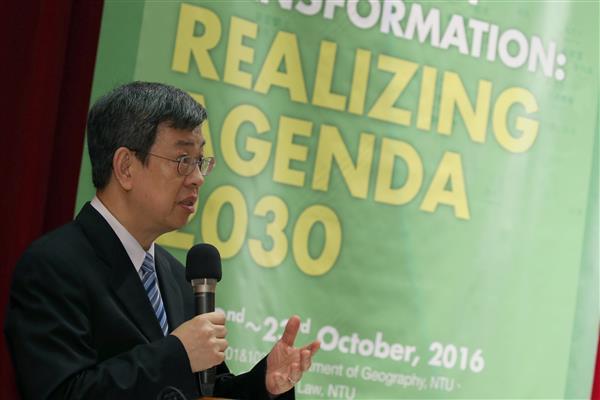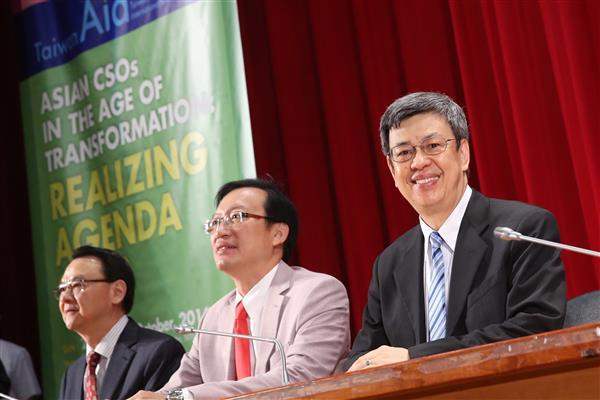News & activities
 News releases
News releases
2016-10-23
Vice President Chen's remarks at 2016 Asian NGOs International Development Conference
On the morning of October 23, Vice President Chen Chien-jen delivered a speech at the opening ceremony of the 2016 Asian NGOs International Development Conference. In his remarks, Vice President Chen stressed that Taiwan has never been absent on the most important global issues, and it will not be absent now. He also expressed hope that the public and private sectors, as well as the international community, will work together toward the United Nations' Sustainable Development Goals.
A transcript of the vice president's remarks as follows:
Note: Italics indicate that Vice President Chen spoke in Mandarin.
Taiwan Alliance in International Development (Taiwan AID) Chairperson Rebecca Wang (王金英);
Deputy Minister of Foreign Affairs Wu Chih-chung (吳志中);
Mr. Justin Kilcullen, Ex-President of CONCORD (European NGO Confederation for Relief and Development);
Korea's Good Neighbors International President Il-ha Yi;
Distinguished Guests;
Ladies and Gentlemen:
Good morning!
On behalf of the government of Taiwan, I am delighted to welcome you to the 2016 Asian NGOs International Development Conference, organized by the Taiwan AID.
First of all, I would like to thank Taiwan AID, National Taiwan University, and all the others for making today’s conference possible.
I. Aid helped to transform Taiwan
It is hard to imagine now, but Taiwan was actually an aid recipient from 1950 to 1965.
We received a total of $1.5 billion in economic aid from the United States. And we also got economic and technical assistance from global actors like the World Health Organization (WHO), the World Bank, the Asian Development Bank, and countries like Japan and Saudi Arabia.
Thanks to this aid, and also the hard work of our people, Taiwan underwent stunning economic and social development, and transformed itself from an aid recipient into an aid provider.
For instance, my own career as a researcher in the public health field bears witness to how Taiwan built one of the best health care systems in the world, and became a leading provider of public health aid. When there was a SARS outbreak in 2003, and just as mentioned by our deputy minister of foreign affairs, at that time, we were not a member of the WHO, so we tried to get help from some organs of international assistance. Unfortunately, we couldn't get it, because we were not a member of those organizations. Fortunately, we did get very good support from the US CDC, and also from you. At that time, we were fighting against SARS on our own. And finally, we achieved our goal and, just as mentioned by Deputy Minister Wu, we contained the disease within three months. This was a kind of role model for the whole world. At that time I was the health minister because nobody wanted to do the job. And I had a deep feeling that if Taiwan were a member of the WHO we could contribute more. Then we had more than a thousand physicians from the Pacific region coming to Taiwan to learn how to fight against SARS. And we welcomed them. We worked with them shoulder-to-shoulder from morning till night. And we consider that is very important for Taiwan to have a role, to play a more important role in this kind of public health forum. Just as mentioned by Ms. Wang, in the effort to achieve the global Sustainable Development Goals (SDGs), a list of 17 goals, basically, Taiwan can do a lot in the international society to be a good citizen of this global village, but we don’t have the chance. But we will, just as mentioned by Deputy Minister Wu, try our best to be a good citizen in the global village. We will try to do more to prevent poverty, disease, and famine, and also to provide clean water, sanitation and so forth. I also would like to ask our international friends to help us to widen our role, and also to provide more opportunities for our NGOs here to provide more humanitarian aid to the countries in need around the world.
Our main organizer today – Taiwan AID – is a shining example of how far our NGO sector has come. It is made up of 29 Taiwanese NGOs that work on various social issues like medical care, public health, gender equality, rights for the disabled, and youth development.
These areas of focus echo the United Nations' 17 SDGs, and the diversity of these NGOs shows not only the vibrant strength of our civil society, but also the maturity of our democracy. And I know that when there was a tsunami in Southeast Asia and also an earthquake in mainland China, our NGOs did a very good job there despite our limitation for not being a member of the UN or the WHO.
II. Giving back to the world
We are so grateful for the generosity that the world has shown us, and we know that we have a responsibility to give back.
Our NGOs are already doing incredible work, of course, to help people in need everywhere. But we must also thank all the international NGOs here today.
Your cooperation with our NGOs has been key, and has allowed people everywhere to feel the warmth of the Taiwanese people. So I would like to thank those people in those NGOs for helping Taiwan NGOs to do more and more humanitarian action for all the people of the world. Through your assistance, we can do more. It shows how the generosity of international NGOs can help Taiwanese NGOs.
The new government in Taiwan will continue to support the valuable work that NGOs do. President Tsai Ing-wen has already instructed the government to use its long-term partnerships with domestic and overseas NGOs as a practical conduit for extending our global outreach. And just as mentioned by Chairperson Wang that they are making proposals to revise their role in international aid. I feel this is just right, but it needs cooperation between the government and the NGOs. I would like to say a few words in Mandarin. If we can integrate the resources of our private and public sectors along with those of the international community, we shouldn’t just provide assistance to countries with which we have diplomatic relations. We should also help out countries in need throughout the entire world. Following the Indian Ocean tsunami, we didn’t withhold our assistance from those countries just because we had no formal relations, and after mainland China's Sichuan was hit by an earthquake in 2008, a seismic research team from our Academia Sinica was the first to arrive in the disaster area. Taiwan very much wants to work together with other countries around the world toward the achievement of humanitarian assistance and sustainable development goals. However, our government is subject to restraints. Because we are not a UN member, there are times when we must rely on private entities to step in and deliver assistance in places where our government cannot. This is a limitation that Taiwan has to deal with, but we will find a way to burst free of our straightjacket like a butterfly from a cocoon—a beautiful butterfly that spreads love and peace throughout the world.
This will not only benefit our partners around the world, but will also create more favorable conditions for Taiwan to participate more meaningfully in the international community.
Asia is clearly a chief engine of global development in the 21st century. Transformations in Asia impact the whole world. How can we ensure that these impacts are positive for the environment, the economies, and societies? This is a collective challenge for governments and NGOs alike.
Taiwan has never been absent on the most important global issues, and we will not be absent now.
I also hope that this conference, with so many leading minds from the field united here, will spark many ideas and solutions to the challenges we face. To close, I wish all of you a conference of not only success, but also inspiration and action.
Thank you!
A transcript of the vice president's remarks as follows:
Note: Italics indicate that Vice President Chen spoke in Mandarin.
Taiwan Alliance in International Development (Taiwan AID) Chairperson Rebecca Wang (王金英);
Deputy Minister of Foreign Affairs Wu Chih-chung (吳志中);
Mr. Justin Kilcullen, Ex-President of CONCORD (European NGO Confederation for Relief and Development);
Korea's Good Neighbors International President Il-ha Yi;
Distinguished Guests;
Ladies and Gentlemen:
Good morning!
On behalf of the government of Taiwan, I am delighted to welcome you to the 2016 Asian NGOs International Development Conference, organized by the Taiwan AID.
First of all, I would like to thank Taiwan AID, National Taiwan University, and all the others for making today’s conference possible.
I. Aid helped to transform Taiwan
It is hard to imagine now, but Taiwan was actually an aid recipient from 1950 to 1965.
We received a total of $1.5 billion in economic aid from the United States. And we also got economic and technical assistance from global actors like the World Health Organization (WHO), the World Bank, the Asian Development Bank, and countries like Japan and Saudi Arabia.
Thanks to this aid, and also the hard work of our people, Taiwan underwent stunning economic and social development, and transformed itself from an aid recipient into an aid provider.
For instance, my own career as a researcher in the public health field bears witness to how Taiwan built one of the best health care systems in the world, and became a leading provider of public health aid. When there was a SARS outbreak in 2003, and just as mentioned by our deputy minister of foreign affairs, at that time, we were not a member of the WHO, so we tried to get help from some organs of international assistance. Unfortunately, we couldn't get it, because we were not a member of those organizations. Fortunately, we did get very good support from the US CDC, and also from you. At that time, we were fighting against SARS on our own. And finally, we achieved our goal and, just as mentioned by Deputy Minister Wu, we contained the disease within three months. This was a kind of role model for the whole world. At that time I was the health minister because nobody wanted to do the job. And I had a deep feeling that if Taiwan were a member of the WHO we could contribute more. Then we had more than a thousand physicians from the Pacific region coming to Taiwan to learn how to fight against SARS. And we welcomed them. We worked with them shoulder-to-shoulder from morning till night. And we consider that is very important for Taiwan to have a role, to play a more important role in this kind of public health forum. Just as mentioned by Ms. Wang, in the effort to achieve the global Sustainable Development Goals (SDGs), a list of 17 goals, basically, Taiwan can do a lot in the international society to be a good citizen of this global village, but we don’t have the chance. But we will, just as mentioned by Deputy Minister Wu, try our best to be a good citizen in the global village. We will try to do more to prevent poverty, disease, and famine, and also to provide clean water, sanitation and so forth. I also would like to ask our international friends to help us to widen our role, and also to provide more opportunities for our NGOs here to provide more humanitarian aid to the countries in need around the world.
Our main organizer today – Taiwan AID – is a shining example of how far our NGO sector has come. It is made up of 29 Taiwanese NGOs that work on various social issues like medical care, public health, gender equality, rights for the disabled, and youth development.
These areas of focus echo the United Nations' 17 SDGs, and the diversity of these NGOs shows not only the vibrant strength of our civil society, but also the maturity of our democracy. And I know that when there was a tsunami in Southeast Asia and also an earthquake in mainland China, our NGOs did a very good job there despite our limitation for not being a member of the UN or the WHO.
II. Giving back to the world
We are so grateful for the generosity that the world has shown us, and we know that we have a responsibility to give back.
Our NGOs are already doing incredible work, of course, to help people in need everywhere. But we must also thank all the international NGOs here today.
Your cooperation with our NGOs has been key, and has allowed people everywhere to feel the warmth of the Taiwanese people. So I would like to thank those people in those NGOs for helping Taiwan NGOs to do more and more humanitarian action for all the people of the world. Through your assistance, we can do more. It shows how the generosity of international NGOs can help Taiwanese NGOs.
The new government in Taiwan will continue to support the valuable work that NGOs do. President Tsai Ing-wen has already instructed the government to use its long-term partnerships with domestic and overseas NGOs as a practical conduit for extending our global outreach. And just as mentioned by Chairperson Wang that they are making proposals to revise their role in international aid. I feel this is just right, but it needs cooperation between the government and the NGOs. I would like to say a few words in Mandarin. If we can integrate the resources of our private and public sectors along with those of the international community, we shouldn’t just provide assistance to countries with which we have diplomatic relations. We should also help out countries in need throughout the entire world. Following the Indian Ocean tsunami, we didn’t withhold our assistance from those countries just because we had no formal relations, and after mainland China's Sichuan was hit by an earthquake in 2008, a seismic research team from our Academia Sinica was the first to arrive in the disaster area. Taiwan very much wants to work together with other countries around the world toward the achievement of humanitarian assistance and sustainable development goals. However, our government is subject to restraints. Because we are not a UN member, there are times when we must rely on private entities to step in and deliver assistance in places where our government cannot. This is a limitation that Taiwan has to deal with, but we will find a way to burst free of our straightjacket like a butterfly from a cocoon—a beautiful butterfly that spreads love and peace throughout the world.
This will not only benefit our partners around the world, but will also create more favorable conditions for Taiwan to participate more meaningfully in the international community.
Asia is clearly a chief engine of global development in the 21st century. Transformations in Asia impact the whole world. How can we ensure that these impacts are positive for the environment, the economies, and societies? This is a collective challenge for governments and NGOs alike.
Taiwan has never been absent on the most important global issues, and we will not be absent now.
I also hope that this conference, with so many leading minds from the field united here, will spark many ideas and solutions to the challenges we face. To close, I wish all of you a conference of not only success, but also inspiration and action.
Thank you!
Related News

2026-01-20
President Lai confers decoration on former Czech Parliament Chamber of Deputies Speaker Markéta Pekarová Adamová
On the afternoon of January 20, President Lai Ching-te conferred the Order of Brilliant Star with Special Grand Cordon upon Markéta P...

2026-01-15
President Lai meets Japan’s former Chief Cabinet Secretary Kato Katsunobu
On the afternoon of January 15, President Lai Ching-te met with a delegation led by Member of the Japanese House of Representatives and form...

2026-01-14
President Lai meets Phoenix Mayor Kate Gallego
On the afternoon of January 14, President Lai Ching-te met with a delegation led by Mayor of the City of Phoenix, Arizona Kate Gallego. In r...

2026-01-13
President Lai meets Canadian parliamentary delegation
On the afternoon of January 13, President Lai Ching-te met with a Canadian parliamentary delegation. In remarks, President Lai thanked the C...

2026-01-06
President Lai meets delegation from European Parliament
On the morning of January 6, President Lai Ching-te met with a delegation from the European Parliament. In remarks, President Lai said that ...






